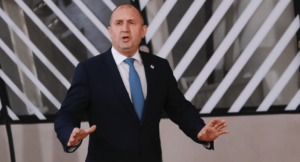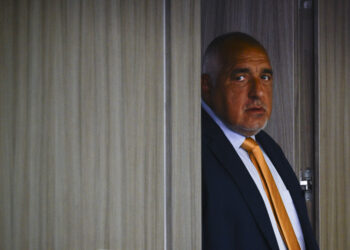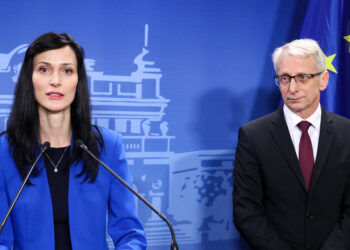Brussels – There is no more hope for Bulgaria, which, following a script seen time after time, will have to hold the umpteenth early elections, the seventh in three and a half years. Having failed three rounds of mandates to try to form a coalition government, the president of the Republic, Rumen Radev, will now have to summon voters to the polls within the next two months after appointing an interim government to carry on ordinary business; the only type that Sofia can now manage at the governmental level.
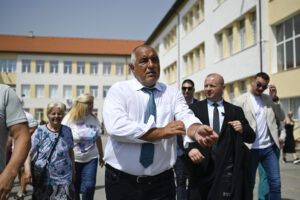
The political chaos emerged in the weeks following the June 9 vote (coinciding with European elections). Despite taking first place at the polls, the conservative GERB (Citizens for European Development of Bulgaria, a member of the European People’s Party) party of former premier Boyko Borissov, failed to complete negotiations with the Movement for Rights and Freedoms (DPS, part of the Alde family of European Liberals) and the populist right-wing There are Such a People (ITN), which joined the European Conservatives and Reformists (ECR) group in the EU Parliament. An empty mandate followed for the real losers in the sixth early elections since April 2021 (despite being the second largest force in Parliament), the liberals of We Continue the Change – Democratic Bulgaria, which had no significant interlocutors after it withdrew support in spring to a coalition government with GERB.
What drove voters to the seventh early elections in three-and-a-half years was the mandate put back into the hands of President Radev by the ITN populists led by showman Slavi Trifonov after finding a lack of support for a right-wing executive. “The electoral spiral continues to rage and not only causes irritation, but also unlocks a series of destructive processes, the blocking of various institutions, and the alienation of citizens,” is the lunge of the head of state, who urged the parties to find a solution to the political crisis: “They must accept that the basis for creating a successful coalition is not after the elections but before them.”
One of the most pressing issues leaders of the major parties will have to address is the citizens’ discontent, with no light at the end of the tunnel of early elections for more than three years. The data speak for itself: in April 2021, turnout stood at 50.61 percent, while in June 2024, it plummeted to 34.41 percent. President Radev is now called upon to appoint an interim prime minister to succeed the former president of the Sofia Court of Accounts, Dimităr Glavčev, who was mandated to temporarily lead Bulgaria from April 6, also on the international stage and in Brussels. After that, voters will be called to the polls at a date within the next two months, according to the provisions of the national Constitution. It would mean mid/late October at the latest, precisely three and a half years since the first of seven rounds of elections in the European Union’s most fragile country.
Three years of political instability in Bulgaria
With the government agreement between GERB and We Continue the Change in May 2023, the political instability that led the country to hold five elections in two years seemed to be over. It started with the outcome of the polls on April 4, 2021, when the conservatives were confirmed as the leading force but in a highly fragmented political landscape: after three months of failed negotiations to form an executive, President Radev decided to call snap elections. Anti-system propaganda awarded the populist movement There is Such a People, founded by showman Trifonov in the July 11 elections. After another four months of unsuccessful negotiations between the parties, President Radev was forced to call new early elections for November of that year.
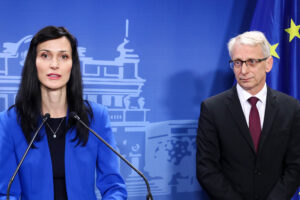
On November 14, 2021, a quarter of the preferences had gone to the anti-corruption We Continue the Change party, bypassing GERB’s conservatives and relegating Trifonov’s populists to the shadows. With the support of these two forces, Kiril Petkov was appointed premier for the first time with a sense of stability and planning for the country’s future. Under his leadership, he pursued talks with North Macedonia to overcome the identity dispute that blocked the opening of negotiations for Skopje’s accession to the EU since December 2020. It was precisely this effort that was fatal to Petkov, although it did not prevent him from bringing the revocation of veto to fruition. First, Trifonov’s party switched to the opposition. Then, on June 22, 2022, GERB filed a motion of no confidence against the government.
After a round of inconclusive consultations, elections were held again in October, with former prime minister Borissov coming in first but with the usual inability to reach an agreement to form a government between the parties. The April 2, 2023 elections confirmed the now chronic political gridlock: the two most established formations were head-to-head with around 25 percent of the vote with the pro-Russian and anti-European nationalists of Vazrazhdane on the rise. Partly for this reason, the more experienced politicians at the European level were called upon and – despite the great difficulty in reaching an agreement between the first and second political forces – the risk of sliding into pro-Russian and anti-European chaos at the new elections convinced both parties to accept a compromise, by alternating the office of premier and vice-premier over the 18 months of government.

As the new government was sworn in on June 6, 2023, Nikolai Denkov became prime minister and Maryia Gabriel deputy prime minister and foreign minister, exchanging roles in the spring before the sudden collapse and the new early return to the polls – the sixth in three years – to coincide with the European elections on June 9. The conservative GERB was confirmed once again the leading party, and the liberals of We Continue the Change – Democratic Bulgaria collapsed. However, the situation of general uncertainty and the inability of the parties to find a governing compromise did not change. As the negotiations between GERB (a member of the European People’s Party), Movement for Rights and Freedoms (part of the Alde family of European liberals), and There is Such a People (a new member of the European Conservatives and Reformists) failed, the scenario of yet another early election has emerged in recent weeks; the seventh in three and a half years.
English version by the Translation Service of Withub
